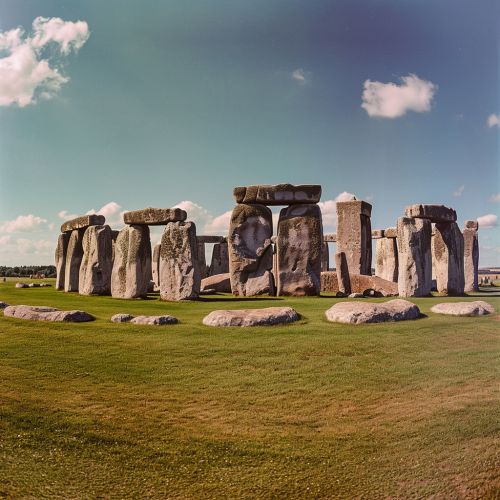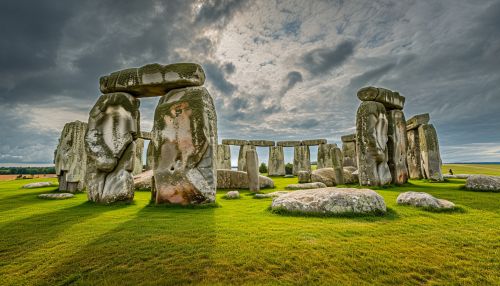History of the United Kingdom
Early History
The history of the UK dates back to the prehistoric times, with evidence of human habitation dating back to at least 800,000 years ago. The Stone Age in Britain was marked by the arrival of the first modern humans, known as Homo sapiens, around 40,000 years ago. This period was followed by the Bronze Age, which saw the development of metalworking skills, and the Iron Age, characterized by the emergence of Celtic culture and hill forts.


Roman Britain
The Roman conquest of Britain in 43 AD, led by Emperor Claudius, marked the start of a period of Roman rule that would last until 410 AD. This period, known as Roman Britain, saw significant changes in the country's culture, infrastructure, and society. The Romans introduced their legal system, Latin language, and Roman culture. They built roads, walls, and forts, the most famous of which is Hadrian's Wall, built to protect the northern frontier of the Roman province.
Anglo-Saxon and Viking Period
Following the end of Roman rule, Britain saw several invasions by the Anglo-Saxons, a collection of Germanic tribes. This period, known as the Anglo-Saxon period, saw the establishment of several kingdoms, including Wessex, Mercia, and Northumbria. The Viking Age began in the late 8th century with the invasion of Britain by the Vikings, seafaring warriors from Scandinavia. The Vikings established several territories, known as the Danelaw, in the east of England.
Norman Conquest
The Norman Conquest of England in 1066, led by William the Conqueror, marked a significant turning point in the country's history. The conquest saw the end of Anglo-Saxon rule and the beginning of Norman rule. The Normans introduced their own culture, language, and feudal system. The Domesday Book, a record of a survey of the wealth and assets of England, was compiled in 1086.
Middle Ages
The Middle Ages, also known as the medieval period, spanned from the 5th to the 15th century. This period saw significant developments in the areas of religion, politics, and culture. The Magna Carta, a charter of rights agreed to by King John in 1215, is one of the most significant documents from this period. The Middle Ages also saw the start of the Hundred Years' War with France and the Black Death, a devastating pandemic that killed a significant portion of the population.
Tudor Period
The Tudor period, which lasted from 1485 to 1603, was marked by the reign of the Tudor dynasty, which included monarchs such as Henry VII, Henry VIII, and Elizabeth I. This period saw significant religious changes, including the English Reformation, which led to the establishment of the Church of England. The Elizabethan era, named after Queen Elizabeth I, was a period of relative peace and prosperity, marked by the flourishing of English literature and drama, including the works of William Shakespeare.
Stuart Period and Civil War
The Stuart period, which lasted from 1603 to 1714, was marked by the reign of the Stuart dynasty. This period saw significant political and religious conflict, culminating in the English Civil War, a series of civil wars and political machinations between Parliamentarians and Royalists. The war ended with the execution of King Charles I and the establishment of the Commonwealth of England under Oliver Cromwell.
Restoration and Glorious Revolution
The Restoration in 1660 saw the return of the monarchy with Charles II. The Glorious Revolution of 1688 saw the overthrow of James II and the ascension of William III and Mary II to the throne. This period also saw the passing of the Bill of Rights 1689, which established the supremacy of Parliament over the monarchy.
Industrial Revolution
The Industrial Revolution, which began in the late 18th century, marked a period of significant industrial, economic, and social change in the UK. This period saw the development of new manufacturing processes, the growth of cities, and significant changes in living conditions. The Industrial Revolution also saw the expansion of the British Empire, making the UK one of the world's leading industrial and trading nations.
Victorian Era
The Victorian era, which lasted from 1837 to 1901, was marked by the reign of Queen Victoria. This period saw significant social, political, and economic change, including the expansion of the British Empire, the passage of several social reform laws, and the growth of industrial cities. The Victorian era also saw the publication of influential works of literature by authors such as Charles Dickens and Thomas Hardy.
20th Century
The 20th century was marked by two World Wars, the decline of the British Empire, and significant social and political change. The UK played a significant role in both World War I and World War II, with the latter leading to significant changes in the country's political landscape and the establishment of the welfare state. The latter half of the 20th century saw the process of decolonization and the end of the British Empire, as well as significant social and cultural change.
21st Century
The 21st century has seen significant political events, including the devolution of powers to Scotland, Wales, and Northern Ireland, and the UK's decision to leave the European Union, known as Brexit. The UK continues to face significant challenges and changes, both domestically and on the international stage.
